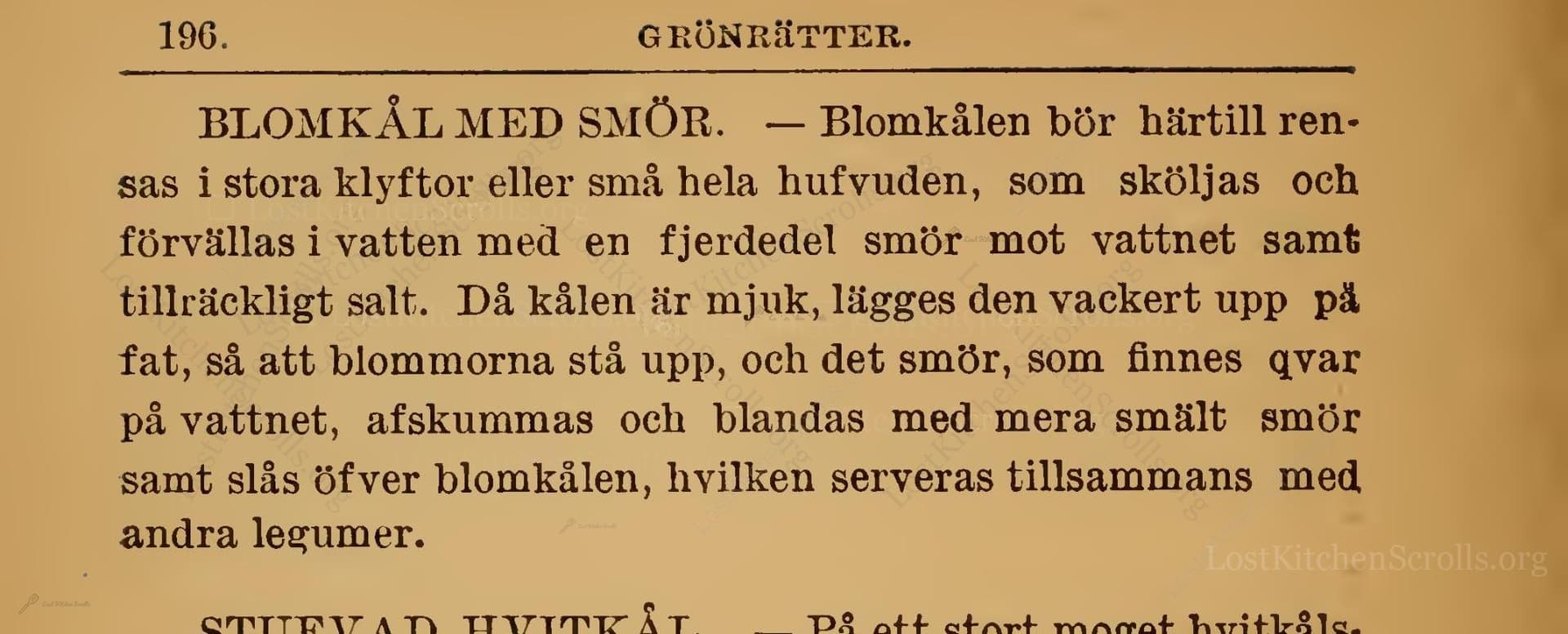
Blomkål Med Smör
"— Blomkålen bör härtill rensas i stora klyftor eller små hela hufvuden, som sköljas och förvällas i vatten med en fjerdedel smör mot vattnet samt tillräckligt salt. Då kålen är mjuk, lägges den vackert upp på fat, så att blommorna stå upp, och det smör, som finnes qvar på vattnet, afskummas och blandas med mera smält smör samt slås öfver blomkålen, hvilken serveras tillsammans med andra legumer."
English Translation
"— The cauliflower should for this be cleaned into large wedges or small whole heads, which are rinsed and parboiled in water with a quarter as much butter as water and enough salt. When the cauliflower is soft, it is nicely arranged on a dish so the florets stand upright, and the butter remaining on the water is skimmed off and mixed with more melted butter, then poured over the cauliflower, which is served together with other vegetables."
Note on the Original Text
The recipe is written in a terse, practical style—common in historical cookbooks, especially those for home cooks rather than professional chefs. Quantities are often relative, emphasizing proportion (such as 'one fourth as much butter as water') rather than exact measurements. Spelling like 'smör' (butter) and 'hufvuden' (heads; modern Swedish: 'huvuden') reflect the Swedish orthography of the late 1800s. Terms like 'legumer' refer broadly to legumes or vegetables, not necessarily legumes as defined botanically today.

Title
Praktisk, illustrerad kok-bok för Svenskarne i Amerika (1889)
You can also click the book image above to peruse the original tome
Writer
C. A. (Charles A.) Vallentin
Era
1889
Publisher
Svenska bok-och musikhandelns förlag
Background
A practical and charmingly illustrated Swedish cookbook tailored for immigrants in America, this 1889 volume serves up a delightful array of recipes and culinary wisdom, blending Old World tradition with New World ingredients.
Kindly made available by
Library of Congress
This recipe is drawn from 'Praktisk, illustrerad kok-bok för Svenskarne i Amerika', published in Minneapolis in 1889 by C.A. Vallentin. The book served Swedish immigrants seeking to maintain their culinary traditions in America, adapting Old World recipes for New World ingredients and kitchens. Simple vegetable dishes like this were common at the time, showing both economy and elegance for festive or everyday tables. The recipe reflects the prized Swedish love for butter and careful vegetable presentation.

In a late 19th-century kitchen, this dish would have been made using a large pot or kettle over a wood- or coal-fired stove. A slotted spoon or skimmer would be used to retrieve the cauliflower. For melting and pouring the butter, a small saucepan or tin cup was standard, and the finished cauliflower would be carefully arranged on a serving platter using a fork or broad spoon.
Prep Time
10 mins
Cook Time
10 mins
Servings
4
We've done our best to adapt this historical recipe for modern kitchens, but some details may still need refinement. We warmly welcome feedback from fellow cooks and culinary historians — your insights support the entire community!
Ingredients
- 1 medium cauliflower (about 1 1/2–2 lbs)
- 4 1/4 cups water
- 1 cup (2 sticks) unsalted butter (plus 3 1/2 tablespoons extra for finishing)
- 1/2 tablespoon salt
Instructions
- Begin by cleaning a medium head of cauliflower and cutting it into large wedges or separating it into small, whole florets.
- Rinse thoroughly.
- Bring a large pot of water (approximately 4 1/4 cups) to a boil and add around 1 cup (2 sticks) of butter (one quarter the volume of water), along with a generous pinch of salt (about 1/2 tablespoon).
- Carefully add the cauliflower pieces and blanch them until tender, about 8-10 minutes.
- Once the cauliflower is soft but still holds shape, remove it with a slotted spoon and arrange on a serving platter, ensuring the florets point upwards for an attractive presentation.
- Skim any remaining butter from the surface of the cooking water, mix with an extra 3 1/2 tablespoons (about 1/4 cup) of melted butter, and pour over the cauliflower.
- Serve immediately, ideally alongside other boiled vegetables (legumes/legumer).
Estimated Calories
350 per serving
Cooking Estimates
You will spend a few minutes preparing the cauliflower and getting your ingredients ready. Cooking the cauliflower only takes around 8-10 minutes in total. Each serving has about 350 calories when divided into four portions.
As noted above, we have made our best effort to translate and adapt this historical recipe for modern kitchens, taking into account ingredients nowadays, cooking techniques, measurements, and so on. However, historical recipes often contain assumptions that require interpretation.
We'd love for anyone to help improve these adaptations. Community contributions are highly welcome. If you have suggestions, corrections, or cooking tips based on your experience with this recipe, please share them below.
Join the Discussion
Rate This Recipe
Dietary Preference
Main Ingredients
Culinary Technique
Occasions

Den Bockfisch In Einer Fleisch Suppen Zu Kochen
This recipe hails from a German manuscript cookbook compiled in 1696, a time whe...

Die Grieß Nudlen Zumachen
This recipe comes from a rather mysterious manuscript cookbook, penned anonymous...

Ein Boudain
This recipe comes from an anonymous German-language manuscript cookbook from 169...

Ein Gesaltzen Citroni
This recipe, dating from 1696, comes from an extensive anonymous German cookbook...
Browse our complete collection of time-honored recipes



